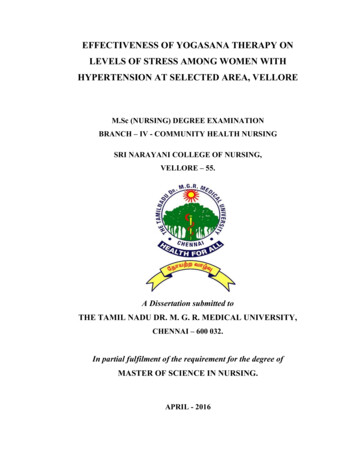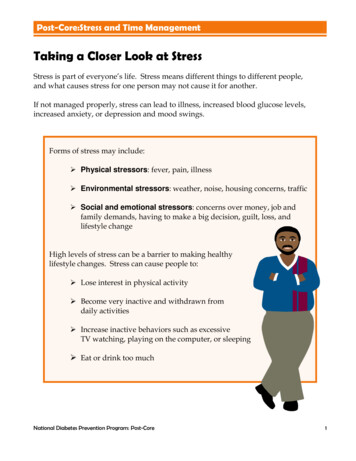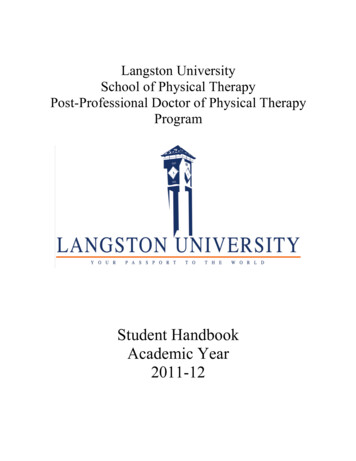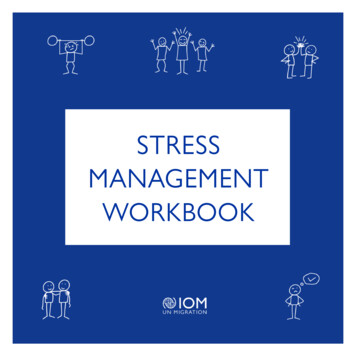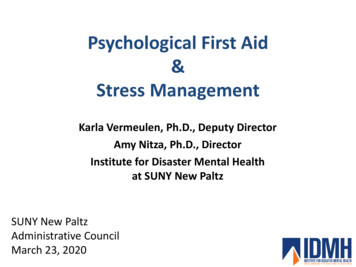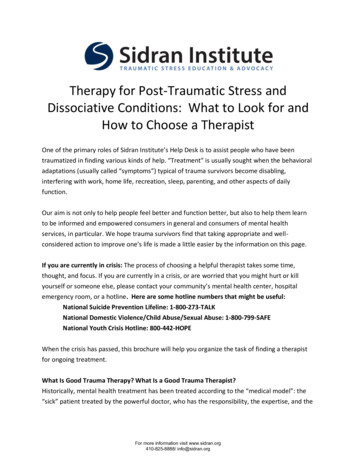
Transcription
Therapy for Post-Traumatic Stress andDissociative Conditions: What to Look for andHow to Choose a TherapistOne of the primary roles of Sidran Institute’s Help Desk is to assist people who have beentraumatized in finding various kinds of help. “Treatment” is usually sought when the behavioraladaptations (usually called “symptoms”) typical of trauma survivors become disabling,interfering with work, home life, recreation, sleep, parenting, and other aspects of dailyfunction.Our aim is not only to help people feel better and function better, but also to help them learnto be informed and empowered consumers in general and consumers of mental healthservices, in particular. We hope trauma survivors find that taking appropriate and wellconsidered action to improve one’s life is made a little easier by the information on this page.If you are currently in crisis: The process of choosing a helpful therapist takes some time,thought, and focus. If you are currently in a crisis, or are worried that you might hurt or killyourself or someone else, please contact your community’s mental health center, hospitalemergency room, or a hotline. Here are some hotline numbers that might be useful:National Suicide Prevention Lifeline: 1-800-273-TALKNational Domestic Violence/Child Abuse/Sexual Abuse: 1-800-799-SAFENational Youth Crisis Hotline: 800-442-HOPEWhen the crisis has passed, this brochure will help you organize the task of finding a therapistfor ongoing treatment.What Is Good Trauma Therapy? What Is a Good Trauma Therapist?Historically, mental health treatment has been treated according to the “medical model”: the“sick” patient treated by the powerful doctor, who has the responsibility, the expertise, and theFor more information visit www.sidran.org410-825-8888/ info@sidran.org
tools to cure the illness. The patient’s job is to be compliant and to follow orders. With somepractitioners, this model continues to this day.Recently, however, some therapy models have come to recognize that individual distress isoften caused or made worse by poor social, political and economic environments as well as byharmful family dynamics. Trauma survivors are generally best served by therapists who workfrom an environmental framework, or “trauma model,” as they are also more likely to see theirclients as experts in their own lives and as partners in healing.Later we will look at some of the different disciplines, approaches, and techniques mostappropriate to trauma therapy. Suffice it to say, however, that good trauma therapists comefrom every discipline, work in all settings, use a variety of approaches and techniques, and havea wide range of credentials and experience.There are aspects, however, that the best trauma therapists have in common. We will start bydiscussing what constitutes good trauma therapy, and then explore how to find it.As Dr. Bessel van der Kolk of Boston University explains, most trauma survivors benefit fromone-on-one psychodynamic therapy. It “allows disclosure of the trauma, the safe expression ofrelated feelings, and the reestablishment of a trusting relationship with at least one person.”Therapists do rest much of their practice on the basis of their professional training. But perhapsas much as anything else, they rest their practice on their integrity and personal talents—ontheir perceptions, feelings, insights, intuition, and the degree to which they can hearunspeakable truths. “Pay more attention to the therapist’s intellectual and emotionalequipment than theoretical system,” Dr. van der Kolk advises survivors. “Pay attention towhether the therapist really wants to hear the troubles you have to tell. Ask yourself, ‘Do I feelvalidated? Is the therapist really listening to my story?'”If validation is one important selection criterion, Dr. Judith Herman, Director of Training at theVictims of Violence Program at Cambridge Hospital in Cambridge, Massachusetts, makes clear asecond criterion and one that seems of equal importance: An effective trauma therapistempowers the survivor rather than imposes a cure.The dual formulation of validation and empowerment seems to be fundamental to posttraumatic therapy.—Excerpt from Unspeakable Truths and Happy Endings: Human Cruelty and the New TraumaTherapy, by Rebecca Coffey (Sidran Institute Press, 1998), pp. 85-86.For more information visit www.sidran.org410-825-8888/ info@sidran.org
The idea of the therapist and client working together as partners, sharing responsibility andexpertise, is still radical in many mental health settings. But for trauma survivors, this is in manyways the key to success in therapy.When treater and client share the trauma perspective they can collaborate. A sharedperspective allows collaboration between the individual, who has expertise on him or herself(the client), and the individual who has expertise on the process of healing (the helper). Helperand client collaborate to identify the central concerns of the survivor. They work together toimprove the survivor’s life. Treatment requires both people’s active participation. The traumamodel is also an empowerment model. The helper has useful information to impart, but is not“the expert” or “the authority” on all matters concerning the survivor. The client is animportant member of his or her own treatment team, and everyone on the team needs tocollaborate to help the client move forward.The four most important things a therapist has to offer a survivor are as follows: Respect Information Connection HopeWith these four components, any relationship can promote healing.—Excerpt from Risking Connection : A Training Curriculum for Working with Survivors ofAbuse, by K.W. Saakvitne, L.A. Pearlman, S.J. Gamble, and Beth Tabor Lev (Sidran InstitutePress, 2000), p. 13.Before You BeginAlthough many trauma survivors find it difficult, now would be a good time to get a completephysical (medical) examination, especially if you have not had one in the past two years. This isimportant for at least three and possibly four reasons: Many medical illnesses (such as thyroid, diabetes, and seizure disorders) might mask orcontribute to mental health conditions and interfere with appropriate psychologicalassessment and treatment. It makes sense to see your physician first to rule out anypotential medical causes of your distress.If you are eventually going to see a psychiatrist for prescribing antidepressant, anti-anxiety,or other symptom-reducing medications, the psychiatrist will require a current medicalevaluation and will want to consult with your personal physician.For more information visit www.sidran.org410-825-8888/ info@sidran.org
Post-traumatic stress disorder has both psychological and physiological symptoms. Thebest way to proceed toward recovery is to attend to medical and emotional needs in asimultaneous and integrated way. Ideally, your physician and your therapist should consultperiodically about your progress.If you have a trusting relationship with a family doctor, internist, or general practicephysician, he or she might be a good source of referrals to a mental health specialist inyour community.Before you actually begin the process of selecting a therapist, it is important to have a workingknowledge of the range of professional options (and there are many). It is important toremember that credentials do not necessarily ensure quality. Still, qualifications are a goodstarting point in evaluating a therapist, and should you ever have a harmful therapy experience,you may have some recourse through a complaint to a licensing body or professionalassociation.Types of Mental Health Care Providers: Alphabet Soup!The words “therapist” and “counselor” are unregulated, generic terms. They can be used torefer to anyone providing treatment and can be used as a title by anyone, with no requirementof special training.In some states, anyone can hang a shingle on their door and practice “therapy” with nothingmore than a high school diploma, so beware of “therapists” with unfamiliar titles.No ethical professional therapist should mind being asked about his or her educational orprofessional backgrounds. You should likely stay away from individuals who don’t have at leasta master’s degree (e.g., M.S., M.S.W., C.S.W., M.A.).PsychologistsIn the United States, Doctors of Philosophy (Ph.D.), Psychology (Psy.D.), or Education (Ed.D.)must complete at least four years of post-graduate school, however, only those who have beenlicensed can call themselves psychologists. Clinical psychologists are specifically trained inassessing a client to determine the problem and to respond by providing treatment. In moststates, if medication is needed in addition to therapy, a psychologist will refer the client to apsychiatrist for that aspect of treatment.However, not all psychologists are experienced therapists. Some specialize in areas such asstatistical research or industrial psychology and may have little experience treating people.Also, don’t assume that Ph.D. always indicates a psychologist. Many people have earned Ph.D.For more information visit www.sidran.org410-825-8888/ info@sidran.org
degrees in unrelated academic fields and may decide to practice therapy without beingclinically trained or licensed.Social WorkersClinical Social Workers (CSW) usually have earned at least a master’s degree (two years ofgraduate school) and some may have doctoral degrees. Clinical social workers credentials mayvary by state, but these are the most common: B.S.W. (Bachelor’s of Social Work)M.S.W. (Master’s of Social Work)A.C.S.W. (Academy of Certified Social Workers)D.C.S.W. (Diplomate of Clinical Social Work).Although there are exceptions, most licensed clinical social workers generally have an “L” infront of their degree (e.g., L.C.S.W.).Marriage and Family Therapists and Professional CounselorsMarriage and family therapists (LMFT), and professional counselors (LPC) may have two yearsof graduate school and have earned at least a master’s degree such as: M.A. (Master of Arts)M.S. (Master of Science)M.Ed. (Master of Education).Marriage and family therapists have additional specialized training in the area of family therapy.Professional counselors, most typically drug or alcohol abuse specialists—C.A.C. I, II, or III(Certified Addiction Counselors)—may have a variety of more generalized training in the area ofpsychology and counseling. A counselor may or may not have a master’s degree. Counselors aretrained for supportive therapy. They usually focus on behavioral problems not clearly classifiedas mental illnesses. Counseling is usually less intensive than psychotherapy.Other Categories of ProfessionalsMany other categories of professionals also provide mental health care services in privatepractices or in agencies.Pastoral counselors are clergy who have the credentials M.Div. (Master of Divinity) Th.D. (Doctor of Theology)For more information visit www.sidran.org410-825-8888/ info@sidran.org
and have a degree from a seminary or rabbinical school with additional training in therapy.Psychiatric nurses and nurse practitioners comprise a growing segment of mental healthtreatment professionals. They display the credentials R.N. (Registered Nurse) R.N.P. (Registered Nurse Practitioner) M.S.N. (Masters of Science in Nursing).A Psychiatric Nurse Clinical Specialist is a registered nurse with a master’s degree who has beentrained in individual, group, and/or family psychotherapy.Psychiatrists are medical doctors (M.D.s), who after completing a medical degree like any otherphysician, follow up with a four-year psychiatry specialty. Psychiatrists’ fees are likely to be thehighest of all mental health providers. In this day of managed care, psychiatrists rarely provide“talk therapy.” It is generally not necessary for a person with a trauma disorder to use apsychiatrist as a primary therapist. However, for those who have complex or co-occurringmedical and mental health conditions, a psychiatrist has the advantage of being a trained M.D.Psychiatrists often work together with other nonmedical psychotherapists to provideprescription and medication management services when needed.The term psychoanalyst refers to any therapist trained in or practicing in the Freudian oranalytic styled psychodynamic approach.Hypnotherapist refers to anyone trained in or practicing hypnosis.A twelve-step sponsor or a mentor can provide support for those seeking help, but they cannottake the place of a psychotherapist.In general, the most helpful therapists are: genuine,willing to share information about themselves as helpful and appropriate,have respect and a high positive regard for their clients,are warm and empathic,are responsive and hopeful,have firm boundaries but are not domineering.For more information visit www.sidran.org410-825-8888/ info@sidran.org
Helpful therapists also have: a variety of clinical skills to address the specific needs of the client;an understanding of the power imbalance that exists in therapy and a willingness to worktoward empowerment of the client;a view of the client as the expert on his or her own life and as an active partner in therapy.awareness of their own biases and the limits of their skill, and willingness to refer you toother professionals if necessary.Consumers of mental health services have contributed to the following list of things to look forin a therapist: Find a therapist you feel comfortable with. Therapy is not an easy process and yourtherapist is not there to be your friend.Find a therapist who respects your individuality, opinions, and self.Find a therapist who will not get upset if you disagree with what he or she has said, butinstead encourages you to express yourself when you do not agree.Find a therapist who never minimizes your experiences and always respects your feelings.Find a therapist who will not try to force you to talk about things that you might not beready for.Find a therapist who does not spend time talking about his or her own problems. Thosesessions are for you, not your therapist.Find a therapist who wants neither a friendship nor a sexual relationship with you outsideof your counseling sessions.Find a therapist who is more than willing to discuss problems that might arise between thetwo of you within the therapist/client relationship.Find a therapist who will help teach you new and healthier ways to cope.Find a therapist who will never make you feel like a failure or cause you to believe they aredisappointed in you if you have a slip or a relapse.Objectives of Therapy to Address Trauma IssuesEffective psychotherapy for trauma survivors usually involves helping the survivor maintainsafety, manage symptoms, and work through the traumatic experience(s). While the techniquesemployed vary, the primary goals of psychotherapy for trauma survivors are: to examine the role of the traumatic experience in the context of the person’s life,currently and historicallyFor more information visit www.sidran.org410-825-8888/ info@sidran.org
to make meaning of the experienceto learn skills to manage symptoms and to develop alternative ways of copingto build or rebuild the ability to trust within a relationship in order to view the world as anincreasingly tolerable place to functionThere has been a lot of controversy about therapy that focuses on memories of past trauma.Because the nature of traumatic stress is to distort memory in a variety of ways (rememberingtoo much about traumatic experiences or too little, and in some cases both), therapeuticdiscussions of the meaning of past events are important. It is not necessary to use specialtechniques to discover hidden memories of violence or abuse. In the course of addressingproblems in current daily function, the opportunity to discuss past events and the ability torecall them will evolve naturally as part of therapy.Types of TherapyThere are many approaches to therapy, and most good therapists are trained in several and usethem in combination. Approaches may be long or short-term and may be focused primarily onthe past or on the present, but all should aim to alleviate distress and help clients learn how toacquire more effective coping strategies.Psychodynamic approaches attempt to help the client discover the origins of the problem in thepast as well as how it affects life today. A behavioral approach tends to focus on changingcurrent behavior with little emphasis on past events. The cognitive approach focuses onchanging the client’s way of thinking, and a family systems approach aims to change unhelpfulpatterns in families.Formats for therapy include individual (or one-on-one) therapy, couples’ therapy, familytherapy, and group therapy. Some therapists use a combination of these formats.Today, many therapists describe their work as eclectic, meaning that they draw from a widevariety of approaches in order to best meet the needs of each individual client. Researchindicates that the quality of the therapeutic relationship is often more important than theparticular methods employed. In therapy for traumatic stress, the relationship is particularlyimportant, as rebuilding interpersonal trust is often a key objective of treatment. The mostimportant thing to remember is that your needs are paramount; choose a therapist whoseapproach seems most appropriate for you.For more information visit www.sidran.org410-825-8888/ info@sidran.org
Getting ReferralsYou can begin the process by getting referrals. REMEMBER: when choosing a therapist, you area consumer of service, and it is your right to shop around.Your family doctor may be able to make a referral for you, although doctors may not knowtherapists who have particular experience with trauma survivors. Sidran Institute has a list oftherapists around the world who have made a commitment to addressing the needs of traumasurvivors. We would be happy to provide names of therapists in your area from which you canchoose. Referral agencies or a women’s resource center in your area may also be able to assistyou in your search. Some insurance companies require that you choose from a list ofpreapproved therapists in your area.You might also ask people you know who’ve been in therapy to make recommendations. Atherapist who’s right for someone else may not be right for you, but someone you trust whohas actually worked with a particular therapist can share very helpful information.Once you have made inquiries, make a list of names of two or three therapists from whom tochoose.The InterviewWhen interviewing a potential therapist, keep in mind your needs and goals for therapy, as wellas the particular qualities you feel are important in a therapist. We often hear about the needfor a “match” when selecting a therapist and there is a lot to be said for feeling comfortablewith the person you choose. Although your objective is not to build a friendship with thetherapist, you will be spending a lot of time together, and you will need to feel comfortableenough to discuss sensitive, confidential thoughts and feelings.Below you will find a list of questions that may help you interview helpers to determine whosuits your needs the best. You may find it helpful to take this list with you on interviews alongwith a pad of paper to record your information.Questions: What are your credentials? What are your specialties? What professional organizations to you belong to? How long have you been conducting therapy?For more information visit www.sidran.org410-825-8888/ info@sidran.org
What experience have you had in treating traumatic stress conditions? How do you approach treatment of traumatic stress conditions? What do you charge? Do you accept insurance? If so, what kinds? Do you have a sliding fee scale? If so, how is payment determined? Do you bill people, or is payment expected at the time of the session? How do you protect client confidentiality? Who (besides you) will have access to my files? How long is each session? Are there exceptions to this? Has anyone ever lodged a formal complaint against you? Have you ever been censured by a professional organization? If I were in crisis, would I be able to reach you? How do you handle crises? What is your policy about missed sessions? What is your policy about physical contact with clients? What is your policy about contact outside of the session? Do you arrange vacation coverage? What happens if one of us decides to terminate without the other’s agreement? Do you think you can help me? Is there anything I should know about your services that I didn’t think to ask about?My impressions: check all that apply: I felt safe and reasonably comfortable I felt understood and taken seriously I was treated respectfully We agreed about the nature of the problem This feels like it could be a good “match” My questions were answered adequately My treatment goals were addressed This individual is clinically qualified I can afford itFor more information visit www.sidran.org410-825-8888/ info@sidran.org
I can get there with reasonable easeOverall impression: Good Fair PoorDon’t forget (or avoid) talking about money. You need to know before you start how you aregoing to pay for treatment. Therapists may take a variety of insurance payments: privateinsurance, Medicare, or state medical assistance; others will offer a payment plan or work on asliding scale, based on what a client can afford. Rarely, a therapist may offer to do “pro bono”work (treat one or a few clients at no charge). As appealing as this may seem, it is not really agood idea, and may under some circumstances be unethical. This dynamic reinforces the powerimbalance that is inherent in the therapy relationship, and the client may come to feel the“debt owed” interferes with therapy.After the first meeting with the potential therapist, you will need to ask yourself somequestions: Did you feel comfortable and able to begin discussing your problems? Did the therapist seem to understand what you were talking about? Did you feel your concerns were taken seriously and that you were treated with respect? Were the two of you in general agreement about the problem and your expectations fortherapy? Were you satisfied with the therapist’s answers to your questions? Did you feel that you could grow to trust and work with this person?Pay attention to your intuition; choosing a helpful therapist will require trusting your ownthoughts and feelings. Remember that you are a consumer of a service and that it is your rightto choose a therapist who best meets your needs.For more information visit www.sidran.org410-825-8888/ info@sidran.org
Taking StockThroughout the course of therapy, you will need to be mindful that your work is productive andcontinues to be helpful. In helpful therapy relationships, the client feels understood andsupported, and while therapy is not always a comfortable experience, there should be a senseof trust and warmth.If you don’t feel respected, valued, or understood, or if your experience is being minimized ordistorted, it may be a sign that your therapy is not working. If you feel there is something wrongin your therapy, or if you get upset or angry with your therapist, discuss it in your session. Ifyour therapist discounts your feelings or responds in a defensive manner, you can choose toswitch to a different, more respectful therapist.If you are working with a helpful therapist, you will begin to be able to better recognize andunderstand your feelings, thoughts, and behaviors. You will also begin to develop new, moreeffective coping strategies, and you should have a sense of change and increased satisfaction inyour life. Over time, you should begin to feel more and more independent and able to use theskill and insights you are learning in therapy to solve your own problems.For more information visit www.sidran.org410-825-8888/ info@sidran.org
M.S.N. (Masters of Science in Nursing). A Psychiatric Nurse linical Specialist is a registered nurse with a masters degree who has been trained in individual, group, and/or family psychotherapy. Psychiatri

